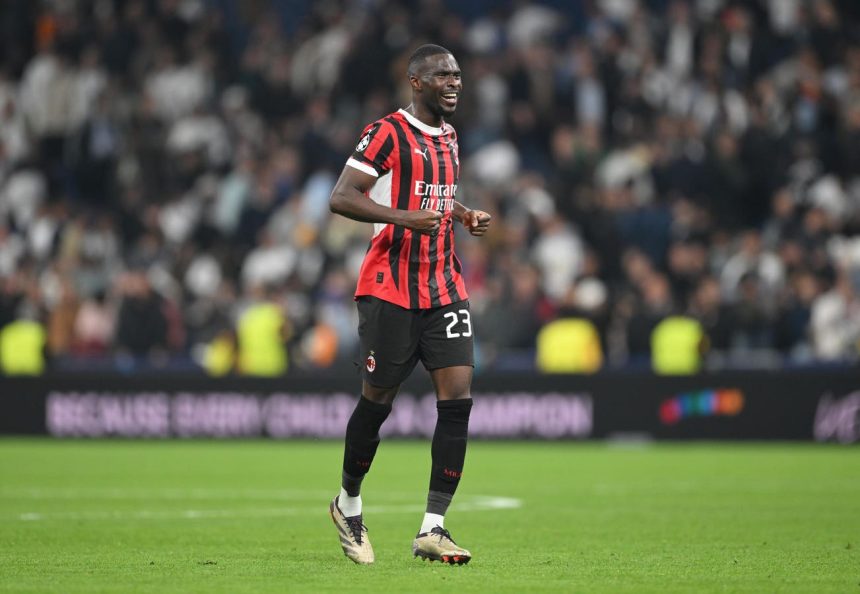Juventus Football Club, under the relatively new stewardship of manager Thiago Motta, finds itself at a crossroads as the January transfer window approaches. Despite an unbeaten record in Serie A, their season has been characterized by an overabundance of draws, leaving them precariously positioned just outside the coveted Champions League qualification spots. This underwhelming performance, coupled with significant injuries, necessitates strategic reinforcements to revitalize their campaign. The club’s defensive vulnerability, particularly following the season-ending injury to key center-back Bremer, has become a glaring weakness. This defensive fragility has directly impacted their ability to secure clean sheets, highlighting the urgent need for defensive reinforcements.
One potential solution to this defensive conundrum involves acquiring AC Milan’s Fikayo Tomori. Tomori, previously a cornerstone of Milan’s defense, has seen his playing time diminish under manager Paulo Fonseca. This presents Juventus with an opportunity to capitalize on Tomori’s situation and offer him a fresh start in Turin. This potential transfer echoes a previous successful transaction between the two clubs, involving Pierre Kalulu. Kalulu, initially acquired on loan, has flourished under Motta’s guidance, becoming a key figure in Juventus’s setup. His impressive performances have solidified his place in the squad, making a permanent transfer at the end of the season almost a certainty. The relatively modest price tag of $14.5 million for Kalulu underscores the shrewd negotiating skills of Juventus sporting director Cristiano Giuntoli.
However, Milan, having witnessed Kalulu’s resurgence at Juventus, will likely be more cautious in any future dealings with their rivals, particularly concerning Tomori. While Juventus are undeniably interested in bolstering their defense, the feasibility of securing Tomori’s services remains uncertain. Juventus are also exploring alternative defensive targets, including Feyenoord’s David Hancko, further demonstrating their commitment to strengthening their backline. This pursuit of defensive reinforcements is further necessitated by the potential departure of veteran defender Danilo. Despite his captaincy, Danilo has struggled to adapt to Motta’s tactical approach, particularly the high defensive line, which exposes his diminishing pace.
Danilo’s potential move to Napoli, under the management of Antonio Conte, a known admirer of the experienced defender, would create a vacancy in Juventus’s squad, further emphasizing the need to secure a replacement. This potential departure adds another layer of complexity to Juventus’s transfer strategy, requiring them to balance outgoing players with incoming reinforcements. Juventus’s transfer ambitions extend beyond defensive reinforcements, with the club also reportedly interested in Napoli’s Giacomo Raspadori. Raspadori, struggling for playing time under Conte’s preferred 4-3-3 system, could find a more suitable role in Motta’s 4-2-3-1 formation, which better complements his skillset.
A potential swap deal involving Danilo and Raspadori has been suggested, but given the significant age difference between the two players, a straight swap seems unlikely. A more realistic scenario might involve a cash adjustment alongside the player exchange. However, Juventus’s pursuit of new players is constrained by financial considerations, requiring them to generate funds through player sales. Midfielder Nicolo Fagioli has emerged as a potential candidate for departure, with a possible sale generating around $27 million. Despite showing flashes of brilliance following his return from a betting ban, Fagioli has fallen down the pecking order under Motta, making a transfer a mutually beneficial outcome.
The January transfer window promises to be a busy period for Juventus, as Giuntoli endeavors to reshape the squad according to Motta’s tactical vision. The club’s transfer strategy reflects a multifaceted approach, addressing both immediate needs and long-term squad building. The pursuit of defensive stability, coupled with the potential acquisition of attacking talent like Raspadori, underscores Juventus’s ambition to regain their dominance in Serie A and secure a return to the Champions League. The delicate balancing act of reinforcing key areas while managing financial constraints will require astute negotiation and strategic decision-making. The success of these transfer endeavors will significantly impact Juventus’s prospects for the remainder of the season and beyond, shaping the club’s trajectory under Motta’s leadership.
The potential acquisition of Tomori or Hancko would directly address the defensive vulnerabilities exposed by Bremer’s absence, providing much-needed stability and solidity at the back. These additions would not only strengthen the starting lineup but also increase squad depth, allowing for greater tactical flexibility. The pursuit of Raspadori signals a desire to enhance the team’s attacking prowess, adding a dynamic and versatile player capable of operating in various attacking roles. Raspadori’s potential arrival would inject creativity and goal-scoring threat into the Juventus attack, complementing the existing attacking options. Furthermore, the sale of Fagioli, while potentially sacrificing some future potential, would provide crucial financial resources to facilitate these incoming transfers. This pragmatic approach demonstrates a willingness to make difficult decisions for the overall benefit of the squad.
The interplay between these potential incoming and outgoing transfers highlights the complex and interconnected nature of squad building. Each move has a ripple effect, impacting other areas of the team and requiring careful consideration of the overall balance and dynamics. The January transfer window represents a crucial opportunity for Juventus to address their weaknesses, bolster their strengths, and set the course for a successful second half of the season. The decisions made during this period will have far-reaching consequences, shaping the team’s identity and determining their ability to achieve their objectives. The pressure is on Giuntoli and Motta to navigate this challenging period effectively and construct a squad capable of competing at the highest level.
The overarching theme of Juventus’s transfer strategy revolves around adapting to Motta’s tactical philosophy while addressing the current squad’s shortcomings. Motta’s preference for a high defensive line necessitates defenders with pace and agility, while his 4-2-3-1 formation requires versatile attacking players capable of contributing both goals and assists. The potential acquisitions of Tomori, Hancko, and Raspadori align perfectly with these tactical requirements, indicating a clear vision for the team’s future direction. The departure of Danilo, a player struggling to adapt to Motta’s system, further emphasizes this commitment to building a squad tailored to the manager’s preferred style of play. The success of this strategy will depend on the ability of the new signings to integrate seamlessly into the team and contribute effectively to the overall performance.
The January transfer window provides a unique opportunity for clubs to recalibrate their squads and address any issues that have arisen during the first half of the season. For Juventus, this window represents a chance to solidify their defensive foundation, enhance their attacking firepower, and create a more balanced and cohesive unit. The decisions made during this period will be crucial in determining whether Juventus can climb the Serie A table and secure a place in next season’s Champions League. The success or failure of these transfers will not only impact the current season but also influence the club’s long-term trajectory. The stakes are high, and the pressure is on Juventus to make the right moves and capitalize on this crucial opportunity to strengthen their squad.
The January transfer window is a period of intense speculation, rumors, and negotiations, and Juventus will undoubtedly be at the center of much of this activity. The club’s pursuit of defensive reinforcements, attacking talent, and the potential sale of key players will keep fans and media alike on the edge of their seats. The outcome of these transfer dealings will shape the narrative of Juventus’s season and determine their ability to achieve their ambitions. The January transfer window is a pivotal moment for Juventus, a chance to reshape their destiny and set the stage for future success. The world will be watching as the Bianconeri navigate this crucial period and strive to build a squad capable of returning them to the pinnacle of Italian football.



